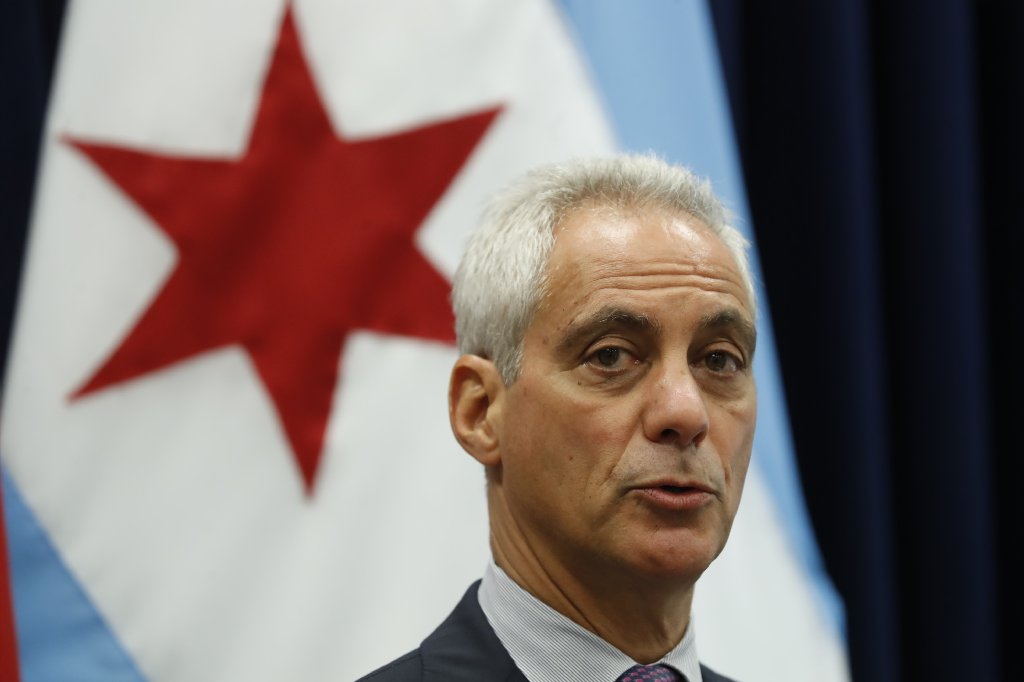Rahm Emanuel’s mayoralty may have ended on October 20, 2014.
That was the day Chicago police officer Jason Van Dyke fired 16 shots into Laquan McDonald from behind, killing the teenager. Emanuel managed to cover up dash-cam footage of the shooting long enough to win a second term in 2015, but it would have been an unavoidable issue in next year’s race. The police chief that Emanuel fired over the shooting, Garry McCarthy, is now running against him, and accusing the mayor of not doing enough to prevent violence on the streets of Chicago. So is Ja'Mal Green, a Black Lives Matter activist calling for a civilian police oversight committee with the power to fire officers.
Emanuel's entire second term has been defined by the McDonald shooting. His approval rating in the black community took a huge hit after the video was released, and he responded by lavishing goodies on that voting bloc — a police and fire training academy on the West Side, a city maintenance garage on the South Side — in order to win back the black voters who twice elected him mayor.
But as the election grew nearer, it became clear it wasn’t enough. State’s Attorney Anita Alvarez was voted out of office over her handling of the shooting, and Rahm didn’t want to be next.
It’s not coincidental that Emanuel is announcing his retirement the day before jury selection begins in Van Dyke’s trial. The timing allows him to dodge accusations that he stepped down in response to revelations about the way his administration handled the shooting that may come out during the trial. It also allows him to avoid dealing with voter anger — and possible defeat — if Van Dyke is acquitted. As the Chicago Sun-Times’s Fran Spielman wrote in a prescient column last week, had Emanuel waited any longer to announce his plans, “he will risk looking like his political future is being dictated by the outcome of the trial of Chicago police Officer Jason Van Dyke.”
If Emanuel had run, he’d have been forced into another difficult runoff. And had he won, he’d have been tasked with finding $1 billion to keep the city’s pensions funded — all while dealing with what’s likely to be a larger progressive bloc on the City Council, and the perception that he was a lame duck serving out his final term. For a multitude of reasons, it’s a good time for Emanuel to get out.
In announcing his retirement, Emanuel said that “[e]very day for the past seven and a half years, that is what I have tried my best to do — to improve our schools, make our community colleges relevant, put our fiscal house on stable footing, confront violence and rebuild trust between police and community, modernize our transportation systems, invest in our neighborhood parks and libraries, and grow our economy into an engine of jobs and opportunity for all.”
And yet: Emanuel closed 54 schools primarily on the South and West Sides, Chicago has led the nation in murders during every year of his mayoralty, and the city is about to witness a trial that dramatizes the mistrust between the police and the citizenry — all decisions and events that eroded the popularity of a mayor who, thanks to his abrasive personality and the perception that he was somebody somebody sent, was never beloved to begin with.
Kofi Ademola, a spokesman for the Black Lives Matter movement, claimed Emanuel as a third scalp to go along with McCarthy and Alvarez, calling his announcement “a great victory.”
“His neoliberal politics destroyed the public good and commonwealth and took all voice and control away from the people,” Ademola said. “There’s been a consistent outcry and momentum to stop his ‘profit over people’ mantra.”
So what now? Emanuel’s retirement makes for the most wide-open Chicago mayor’s race in more than a century. This looks like the first time since 1915, when Big Bill Thompson was elected, that the ballot will include neither an incumbent nor a candidate put up by the powers that be (as Emanuel was in 2011, when he had the endorsement of his former boss President Barack Obama).
Emanuel’s weakness had already attracted a raft of challengers. This morning, retiring Ald. Ricardo Munoz, who had been thinking of a run in 2023, said that he is “seriously considering” running in response to Emanuel’s announcement. Munoz is a protégé of soon-to-be-congressman Jesus “Chuy” Garcia, and would be a strong candidate if he can add to the base of Latinos and white progressives who supported Garcia’s candidacy in 2015.
Ameya Pawar, another retiring alderman who ran for governor last year, may have the ambition and citywide profile to run.
Then there are the other big names being mentioned: Attorney General Lisa Madigan, retiring Rep. Luis Gutierrez, former Secretary of Education Arne Duncan, Cook County Commissioner Bridget Gainer, City Treasurer Kurt Summers, Cook County Sheriff Tom Dart, former presidential adviser Valerie Jarrett, Cook County Board President Toni Preckwinkle, and yes, Chance the Rapper.
And hey, when Barack Obama got involved in politics, he wanted to be mayor of Chicago, like his idol, Harold Washington. The presidency got in the way, but this could be his moment!
All this to say: It’s going to be the biggest political free-for-all ever seen in a city that’s already a political free-for-all every day. Watch this space.



